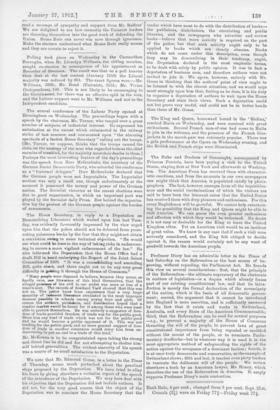Professor Dicey has an admirable letter in the Times of
last Saturday on the Refereatium.as the best means of im- proving, without repealing, the Parliament Act. He founds this view on several considerations : first, that the principle of the Referendum—the ultimate supremacy of the electorate in matters of legislation—is a dogma which already forms part of our existing constitutional law, and that its intro. dnction is merely the formal declaration of the sovereignty of the nation, which is the basis of all democratic govern- ment; second, the argument that it cannot be introduced into England is mere assertion, and is sufficiently answered by the fact that it exists and works in Switzerland, Australia, and every State of the American Commonwealth; third, that the Referendum can be used for several purposes —e.g., to prevent a majority of the House of Commons thwarting the will of the people, to prevent laws of great constitutional importance from being repealed or modified without the assent of the people, or to terminate Parlia- mentary deadlocks—but in whatever way it is used it is the most appropriate method of safeguarding the rights of the nation against the arrogance of a dominant faction; fourth, it. is at once truly democratic and conservative, as the example of Switzerland shows ; fifth and last, it teaches even party leaders to venerate the deliberate will of the people. We review elsewhere a book by an American lawyer, Mr. Honey, which describes the use of the Referendum in America. It amply supports Professor Dicey's main contention.






















































 Previous page
Previous page